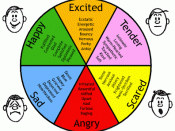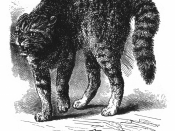The inner desires
E-motion is preparing and anticipation action and feelings are the internal expressions of the emotion and can be differentiated from body sensations'1.
A body is the integral physical material of an individual. When a body is in motion, it does not coincide with itself. It coincides with its own transition: its own variation In motion, a body is in an immediate, unfolding its relation to the mind. This explains the 'Explicit body in Performance'.1 The mind as a stage in conjunction with the body is demonstrated as uses the stage to put aspects of the objectified body image in quotes, the 'Implicit body as Performance' I have no idea the precise time when consciousness happens, I am not a psychologist, nor a neuroscience etc. What I am is a person who lives in a body and has a mind. And know the mind to enable the integration and distribution of essential information.
This is apparently also a major function of consciousness in the brain. Antonio Damasio (1999) in 'The Feeling of What Happens' makes a distinction between feelings and emotion. And also 'the mind as stage'
In ancient Greece, art was something that was integral to the culture of the people. Emotion was interpreted as a dimension in which art is experienced. Art was something that was deeper than part of the surface culture: it was part of their spirituality experience. The Greeks developed the connection between art and celebration. Art derived its development from the duality of Apollo and Dionysus. Apollo was a Greek god and, later, a Roman god, the son of mighty Zeus and the Titan Leto. Dionysus is the god of wine, the inspirer of ritual madness and ecstasy, and a major figure of Greek mythology. Apollo in ancient Greek culture represented the...


